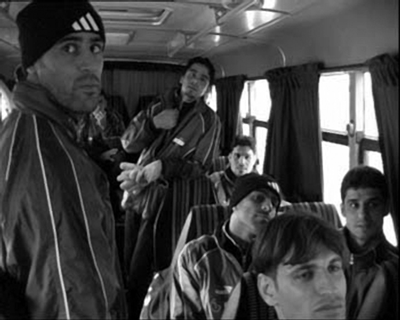Diversity of Middle Eastern cinema handsomely showcased in new festival
New York sees more than its share of new film festivals, but few are as heartening as the CinemaEast Film Festival, a new annual showcase of Middle Eastern cinemas, at the Quad through November 10. Coinciding with Eid al-Fitr, the end of Ramadan fasting, CinemaEast also provides the ideal antidote to the Gulf War boosterism of “Jarhead.”
Building upon five seasons of the popular ArteEast screening series, executive director Livia Alexander gathered a blue-chip selection committee for the inaugural festival and drafted Rasha Salti to pull everything together. The selection panel included Syrian director/producer Hala Abdalla Yacoub, Iranian producer Marjaneh Moghimi, Kurdish director Bahman Ghobadi, Palestinian auteur Elia Suleiman, Village Voice critic Michael Atkinson, and queer author Gary Indiana. The result is a well-proportioned lineup of some 50 features and shorts, with an exceptional documentary slate and strong showings of Turkish and Palestinian works.
CinemaEast opens Friday with the New York premiere of “I Love Cinema” by the young Egyptian director Oussama Fawzi. A lavishly produced, self-referential paean to the movies, Fawzi spins this broadly comic saga of one Coptic family in Cairo’s heavily Christian Shubra district around the insatiable movie love of their little squirt Naïm (Youssef Osman). Set in 1966 as Nasser’s rule is waning, the precocious brat Naïm stokes his film fetish between scoldings from his puritanical dad, Adly (Mahmoud Hemeida), and plenty of TLC from his way more liberal school-principal mom, Nemat (Laila Elwi).
Fawzi stuffs this confectionary comedy with a notably bittersweet filling. Nemat’s long-dormant passion for painting, abandoned at Adly’s insistence, is rekindled by an urbane art consultant at her school. Meanwhile, the proto-fanatic Adly—a doormat at his civil-service job who sprays impotent rage at the family—is diagnosed with a cardiac ailment that only quickens his crumbling faith in both Nasser’s authority and his religion. Some details, like Naïm’s manipulativeness, or his tic of peeing on strangers from balconies, would be frankly unsettling if we weren’t so thoroughly entertained.
“I Love Cinema” is irradiated with star power, and triumphs largely thanks to Elwi and Hemeida as Naïm’s parents, both acclaimed for their work with the Egyptian auteur Youssef Chahine. The glorious comedienne Elwi—immortalized as the gypsy Manuela in Chahine’s “Destiny”—invests Nemat with unbroken determination as well as soul-deep yearning. The actor’s actor Hemeida conveys his seemingly straw-man character through an extraordinary crucible, at one point dropping to his knees in a midnight alley, addressing God in a spine-tingling, tear-choked entreaty—“I go to confession, I fast, I pray, but … I’m always afraid of you. I long to love you…”
Perhaps most surprising, at least to this Occidental observer, is the film’s sexual forthrightness. Nemat and Adly share two lovemaking scenes—one in darkness, the other in sunlight—pitched in a fragile equilibrium, and played with consummate dignity and conviction by Elwi. Fawzi’s nuanced portrayal of their marriage is contrasted with their bovine daughter’s star-crossed union with a slovenly dunce, more typical of Egyptian popular comedy.
“I Love Cinema” is imbued with affectionate nostalgia for Egyptian cinema’s Cold War heyday, but the film emerges in a contemporary context of severe economic recession, routine corruption, and civil unrest that came to a flashpoint over the recent elections extending Hosni Mubarak’s 24-year regime. In this climate of social polarization, the film has already stirred predictable controversy over its depiction of Copts, given fresh resonance by the attacks on a Copt church in Alexandria last month.
“Waiting for the Clouds,” the third feature from Yesim Ustaoglu, one of Turkish cinema’s most gifted directors, continues her project of subverting doctrinal notions of a unitary Turkish identity by making the viewer see and feel through the eyes of Turkey’s minorities. Her previous feature “Journey to the Sun” bore searing witness to the dispossession of the Turkish Kurds, while here she goes deep inside the little-known population of ethnic Greeks, or Pontoi, who inhabited the craggy shores and mist-clad mountains of Turkey’s Black Sea coast for some 2,500 years until their forced displacement at the end of the Ottoman era.
With characteristic sensitivity and insight, Ustaoglu exhumes a 1916 anti-Greek pogrom—a phase of the same campaign against Christian minorities that smote the Armenians—from the vantage of 1975, when we meet the rugged old bird Ayshe. Like the rest of the Pontoi, Ayshe speaks mainly in Turkish instead of her native tongue, a dialect forbidden by the Ottomans and barely intelligible to mainland Greeks.
Her frail sister’s death plunges Ayshe into an abyss of repressed memory, and propels her in search of a long-lost brother, Niko, whom she hasn’t seen in decades. When at last she tracks him down, he angrily slams the door in her face—a gesture that anticipates Greek society’s rejection of the Pontoi, expelled en masse from Turkey in the 1922 population exchange, yet shunned for decades by their own people in their own putative nation.
Not the least remarkable aspect of “Waiting for the Clouds” is that only a few years ago, its very existence would have been unthinkable under the tighter censorship imposed on depictions of minorities in film and other media. But the historical convergence of internal realignment—the “soft Islam” policies of the three-year-old Justice and Development Party administration—and external pressures, principally Turkey’s ambitions to satisfy European Union membership standards, has resulted in appreciably more open circumstances for filmmakers.
There’s much more. En route to the closing night premiere of “Clay Dolls” by Tunisian master Nouri Bouzid, CinemaEast packs in more top-caliber features and revelatory documentaries. Nonfiction standouts include M. Namik Ugur and Mustafa Saglam’s “Wedding to Severance,” an autobiographical view of Kurdish marital customs; Cynthia Choucair’s “Elie Fairuz,” a compact portrait of a Lebanese man who’s fashioned his life around the identically voiced musical diva Fairuz; and “Iraq We Never Parted,” a spirited profile of the Iraqi national football team by Egyptian director Ahmed Rashwan.
Take a ride on this maiden voyage. CinemaEast is a watershed event, and the festival New York needs right now.
gaycitynews.com


































